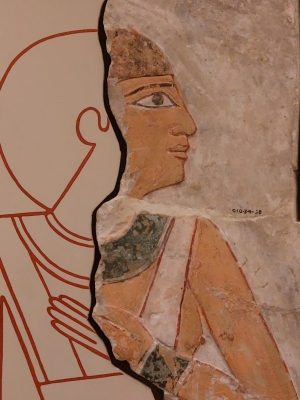

Venue: Hybrid event hosted by National
Abstract
The excavations conducted at Deir el-Bahari by Naville (1903–1907) and Winlock (1920–1931) uncovered a remarkable collection of female burials within the funerary temple of Mentuhotep II. These burials were arranged in four different clusters. Additionally, an opulent rock-cult tomb beyond the temple’s northern precinct contained another female burial. In total, approximately thirty women were interred within the king’s funerary complex, with variations in tomb architecture, burial goods, and body treatment suggesting differences in their background, social role, and status. While some of these women have been definitively identified as “royal women” (Hmt-nswt), the status and purpose of the others remain subject to debate. The variety of titles associated with them has led scholars to propose multiple interpretations over time, including “concubine,” “musician,” “priestess,” “cultic wife,” and even “(unchosen) candidate for royal marriage.”This presentation will first review previous research on the various female groups within the temple (i.a. Winlock, Ward, Gillam, Sabbahy, Roehrig) before shifting focus to new perspectives on their roles within the elite. By reassessing these women’s positions in relation to court politics, religious practices, and the history of local cults—particularly the veneration of Hathor—this study seeks to refine our understanding of female agency in the Theban court. Given Hathor’s prominence in this part of Western Thebes and her integration into Mentuhotep II’s ideological framework, her cult may provide crucial insights into the women’s functions. Ultimately, this approach aims to challenge interpretations that overlook distinctions among those individuals, instead offering a more nuanced reconstruction of their identities, responsibilities, and relationships within the royal court.
About the Speaker
Antonio Morales is Associate Professor in Egyptology in the Seminar of Ancient History at the University of Alcalá (UAH). Currently, he has joined the Department of Near Eastern Languages and Civilizations at Yale University as Fulbright Visiting Scholar. In 2022, he was visiting professor at the Department of Near Eastern Languages and Civilizations at Harvard University. Previously, he was Research Associate in Egyptology at Freie Universität Berlin, postdoctoral researcher at Heidelberg Universität, and research collaborator in the British Museum. He obtained his PhD in Egyptology from the University of Pennsylvania (2013), with a dissertation dealing with the transmission of the Pyramid Texts from the Old to the Middle Kingdoms. Antonio Morales has participated in various expeditions to Egypt and is currently the director of The Middle Kingdom Theban Project. He has published multiple articles in scientific journals and contributions to books, including a recent co-edition (with Alejandro Jiménez-Serrano) on Middle Kingdom archaeology and history in the Harvard Egyptological Studies (Brill 2022), and a monograph on the transmission of Pyramid Texts of Nut (Buske Verlag 2019).
This is a hybrid event; join In-Person or Online
In Person Location: 15 King's College Cir, Toronto, ON M5S 3H7 - Room UC 161
This lecture supports the SSEA's Sally Katary Memorial Fund. We appreciate you generosity.
If you wish to make a donation towards the Sally L.D. Katary Travel Scholarship, you can do at any time. Please click here to find out how to help.
Powered by iCagenda